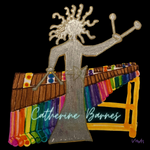| This is an excerpt from my February 2023 email newsletter “The Brain Break,” which I send out once a month on or around the full moon. If you like what you’ve read here, subscribe so you can be the first to read my writing, get tickets to upcoming performances, and find out when I have openings for private lessons. |
| Inspired by my college friend, soprano Anne Slovin, who has spoken bravely and candidly about her own vocal fold surgery and subsequent recovery, I decided to go on social media over the past couple of weeks and talk about a subject that scares the crap out of me: playing-related injuries. Also known as “repetitive stress injuries,” or RSI’s, musicians get them from pushing down keys, pressing their lips into a horn, singing for hours a day, holding a violin and bow at an awkward angle, or in my case, hitting stuff with my hands and sticks. I first sought treatment for the RSI in my right elbow in 2010. However, I think it must have started between 2004 and 2008, when I was still in college. I can remember feeling a pinch in my right elbow as I practiced snare drum, but I never said anything about it to my professors. I was too afraid. I had already gotten a message from various Musical Authority Figures that I was “behind,” and I did not want to give them any additional reasons to doubt my abilities. Besides, it wasn’t too bothersome at that point. In the last several years, the pain has gotten worse, and now it’s in my left elbow, too. I have tried a variety of different modalities to fix it, including but not limited to: – Yoga – Seeing a chiropractor -Alexander Technique – Wearing a brace – Physical therapy – Acupuncture – A “performing arts injury specialist” I have experienced some relief from most of these treatments. However, none of them made the pain go completely away. Throughout high school and college, the Musical Authority Figures also told me: “If you are playing with correct technique, you will not get injured.” Having internalized this message, my thoughts as I struggle with my injury go something like this: – This is happening because your technique is bad. – This is happening because you aren’t a good musician. – This is happening because you had the hubris to think that you could ever earn a living playing your instrument, and now God/the Universe/the Giant Cosmic Muffin in the Sky is punishing you. But lately, I’ve started to question whether bad technique is necessarily responsible for injuries in all cases. I watched a video featuring Gregg Bissonette, a famous studio drummer, and Dr. Luga DePodesta, a former sports medicine doctor for the LA Dodgers. Dr. DePodesta helped Mr. Bissonnette recover from a repetitive strain injury and discovered his own passion for drumming in the process. Towards the end of the video, he mentions almost as an afterthought that some drummers will get injured even if they are playing correctly in terms of their technique and their setups. Given the hours that I have spent playing in front of mirrors and watching recordings of myself, this gave me some peace. I’ve also wondered if folks in other professions prone to repetitive strain injuries have the same kinds of self-critical thoughts that I do. Computer programmers, construction workers, lawyers, and even dentists get RSI’s. I’m going to choose dentists as my line of inquiry in order to troll my uncle, who is probably too busy inflicting pain in someone’s mouth to read this. I wonder if injured dentists sit around and think: – This is happening because my drilling technique is bad. – This is happening because I am a bad dentist. – This is happening because I had the hubris to think I could earn a living in dentistry, and God/the Universe/the Giant Cosmic Muffin in the Sky is now punishing me. I doubt it. They probably just do everything they can to fix their injuries. Granted, they likely have more money to throw at the problem than most musicians. However, I challenge you to go to a single public place and not hear music of some kind. Musicians might not be compensated in the same way as dentists, but we certainly contribute just as much to society. (And we are A LOT more fun to hang out with. No offense, Uncle Doug 😎) I won’t pretend that dealing with this injury is not scary, and that I don’t worry I’ll have to quit music and do something distasteful but lucrative, like software engineering, which seems to be claiming many of my former colleagues. (Musicians supposedly make great programmers). However, two facts keep me from spiraling: – The computer hurts my elbows as much or more than playing the drums. In fact, I think it is one of the major culprits for this injury, along with the smartphone. – There are many famous musicians who have struggled with repetitive strain injuries and recovered. Here are the ones that immediately come to mind in no particular order: – Julie Andrews -Sheila E – Vinnie Colaiuta – Gregg Bissonnette (already mentioned, but bears repeating) – Yo-Yo Ma In fact, I met Yo-Yo Ma for a few minutes when I was 16 years old, and he had a message relevant to the problems I’m currently facing. |
| The Time I Met Yo-Yo Ma |
| It was the summer of 2003, and I was attending the Boston University at Tanglewood Institute – a very high-class band camp for high school musicians affiliated with Boston University and the Tanglewood Music Center, which is the summer home of the Boston Symphony. Every day, we would get on buses and go from our dorms to Tanglewood, where we heard the Boston Symphony and lots of other big names in the classical music world. After one such concert, I was standing around with my fellow music students, when one of them excitedly waved to someone and walked away into the trees. We all decided to follow. At last, we made it through the trees into a clearing… …and there was my colleague… …a girl with a violin case (Yo-Yo Ma’s daughter)… …a very nice car… …and Yo-Yo Ma! Yo-Yo Ma saw us walking towards him, and he waved. He asked us each our names and what instruments we played. Then he said, “Now, I want you all to know that it’s very important to stretch before you play. Let me show you some good stretches that I like to do.” He reached out each arm and demonstrated some wrist stretches. Next, he put his hand on the hood of his very expensive car and twisted it around to demonstrate an arm stretch. He repeated the stretch with the other arm. I struggled to process the fact that I was watching the most famous cellist in the world do movements that would not have been out of place in a school PE class. The colleague who originally wandered off turned to us and pointed to Yo-Yo Ma’s daughter. “We know each other from Youth Symphony! So, I’ll see you guys later… I’m gonna get a ride with Yo-Yo Ma. Have fun taking the bus!” Yo-Yo Ma gave us a final wave before the three of them got in the car and drove away. It fascinates me that when confronted with a cohort of wide-eyed teenage music students, Yo-Yo Ma’s message to us was not “practice makes perfect” or “no pain, no gain”… It was “stretch before you play.” Or in other words, take care of your body. Take care of yourself. You are more important than your instrument. There is no music without you. (I’m embellishing a little bit…but it’s been a few years, so I’ve had time.) My wish for this injury is that it will make me a better musician. I also hope that it will make me a better teacher. Trying to get my teenage percussion students to warm up before playing is kind of like trying to get a toddler to eat vegetables (or getting a doctor to order imaging so you can figure out what’s actually going on with your injury…) … you must be cunning, crafty, and creative! But I was delighted last weekend when a private student told me that he had been doing his baseball stretches before playing marimba. “I’ve noticed that it hurts if I don’t stretch or play slowly before I start playing fast,” he said in our last lesson. I may not be Yo-Yo Ma, but my student does know I’m fighting an injury of my own. That’s probably why he decided to listen to me. So perhaps it’s already happening. |
| Some resources I’ve found helpful… |
| Musician’s Well – Stories of orchestral musicians who have overcome their injuries. My main takeaways from this have been that there is no one size fits all treatment for RSI, and there is a psychosomatic component to these injuries. Unfortunately, there are no percussionists featured on this page. Classical Wellness – An Instagram account dedicated to healthy practicing. I highly recommend the free “sustainable morning routine“ PDF that you get for signing up for her newsletter. It’s one of the best pieces of content I’ve seen in a while Practice Happier – A bassoonist who overcame a playing-related injury and won a job in an orchestra in Mexico. She gives lots of music business and healthy practice tips. |
The Time I Met Yo-Yo Ma

